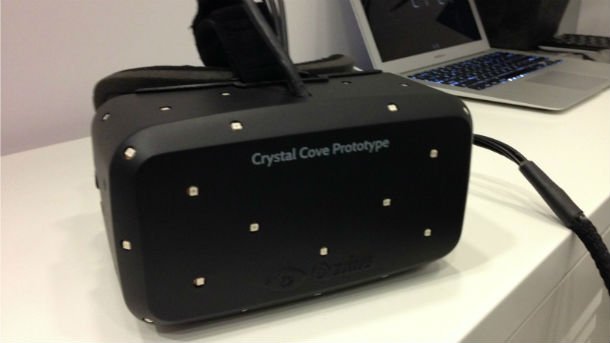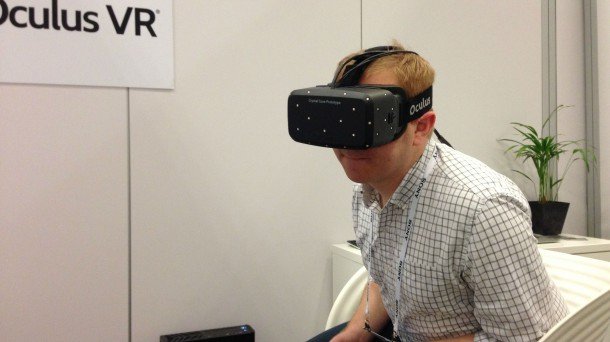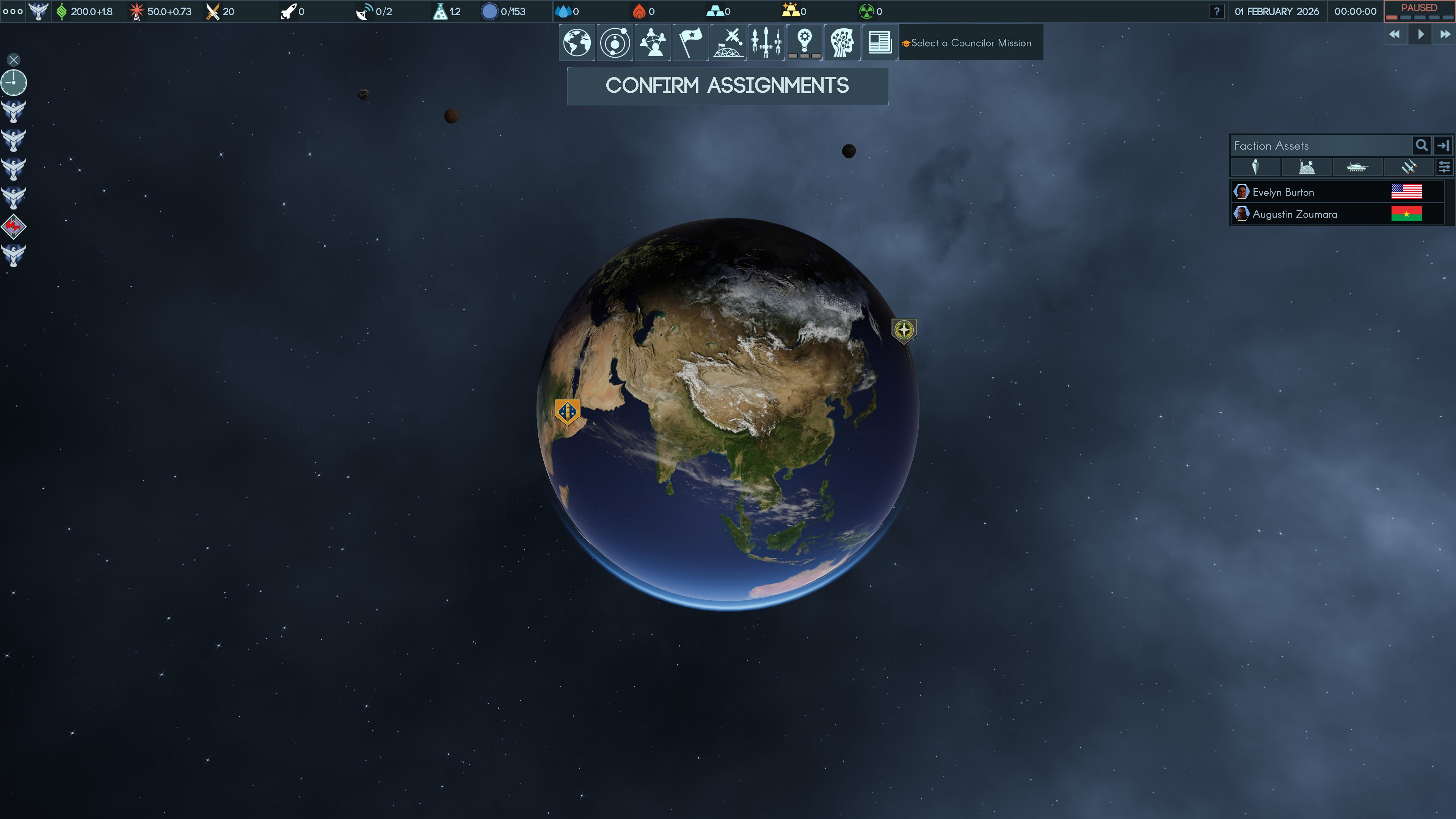Palmer Luckey interview: The new Oculus Rift prototype and the future of VR

It's safe to say that Oculus VR founder Palmer Luckey was exhausted when we sat down at last week's International CES to chat. He'd been in town for eight days, talking to the press and showing the newest Oculus Rift prototype, dubbed " Crystal Cove ." The newest headset uses 360 degree positional tracking and low persistence motion blur tech to essentially keep wimps like me from vomiting during use. But even though he was wiped, Luckey still took a few moments to talk to me about the promise of VR for videogames and beyond, the rumors of John Carmack making an Oculus Rift game, and his thoughts PC gaming moving to the living room.
PC Gamer: How far along are you guys? How far away from release are you?
Palmer Luckey: Nothing to announce. We're really far. We've got really well developed software, we've got really well developed hardware, we're building our team out and we're going to be able to deliver the kind of consumer product that we want to deliver.
How big is the team?
69 people.
I'm impressed by the sheer level of development work happening from outside your company, like from the community. What are their biggest priorities?
Keep up to date with the most important stories and the best deals, as picked by the PC Gamer team.
Well, there are a lot of people doing a lot of different things. Some people are just messing around, some people are triple-A game developers and indie game developers, and some people are in the professional space, like medical, military, industrial, computer modeling, etc. So I think that there's really a wide range of goals. We've sold 50,000 units of the developer kit, so there are so many things people are doing with them that we're not even aware of.
How did you go about addressing the concerns with motion sickness?
It's a lot of things. You have to reduce the latency, you need to reduce the motion blur, increase the resolution. And a lot of it is also content dependent, as well. No matter how good you make a VR headset, it won't necessarily let you do everything you can do on a monitor without feeling disorienting, and that's because a lot of things that you do in traditional games would make you sick if you did them in real life. The only reason it works is because your brain doesn't actually get tricked into thinking it's in a virtual space. So even if we make a perfect VR headset and make everything flawless, there will still be certain experiences—barrel rolls in a fighter—that are going to make you sick. Or very fast altitude changes, which makes people sick in real life, or even just vertigo, looking down from a great height. We can't get rid of all of those effects, so a lot of those issues are content dependent. We're trying to fix all of the hardware, and then people will have to make good software.
Do you have a favorite demo?
I can't say all of my favorites, because we're working with a lot of people who haven't publicly announced their projects, but I like Eve: Valkyrie. That's a fun multiplayer game, and we've spent a lot of time in the office playing it.

Originally you were focused on virtual reality in the gaming space, but it seems like you're branching out from there now.
I don't know that we're branching out—it's more that people are coming to us. VR died in the consumer market years ago, in the 80s and 90s, but the professional market has continued to exist. The military kept going, a lot of medical applications were still going. And they were just really expensive pieces of gear that didn't always provide a very good experience. So what's kind of happening is that those same industries that have always been using VR, even though it was expensive, are now expanding and doing a lot more things now that the hardware and software is cheap. Like, we had a medical school that ordered 20 dev kits for their students who are doing 3D medical scan visualization. And they never would have done that before because it wasn't remotely cost feasible. Now they're saying, “Hey, this entire class will have their own VR headset.”
It's the most exciting technology of the last century.
That's a bold statement.
I didn't say it's going to be the most successful , but I think it is one of the most exciting, especially when you think of the potential.
Right now, VR is only going to appeal to a certain segment of the population—and it's going to be a big one—but a certain segment that is willing to accept trade offs and willing to spend time in a virtual environment that is inferior to a real environment because they'll be able to do things they'd never be able to do or afford, or are too dangerous. When VR is really going to take off, at some point in the future, if we can push it—or if someone can really push—it to where VR has none of the downsides of real life interaction.
Think of Facebook. People interact on Facebook a lot and in real life a lot. But right now Facebook is largely a tool to organize meeting up with people in real life. And that's because even though we talk to people online, it's a very crippled experience to actually doing things and spending time with people in real life. It's more convenient, but you lose a lot.
We're in a similar situation with VR. Right now, VR is kind of a crippled version of reality where there are reasons to use it, but you wouldn't use it for everything. When VR is going to be exciting is when it gets as good as real life at everything, and you start to say, well, why would I travel on a business meeting across the world just to go sit face-to-face with people, if we can just plug in Rifts and get all of the same nuance of communication we could have gotten otherwise.
That's what's really exciting about it.
That's some super future-looking, Snow Crash -level stuff, but I love that this future is starting with games.
Yes! And gamers are the ones that I think are most accepting of this kind of new technology. They're not going to say, “Oh, how can this technology integrate into my normal daily life without really changing it or how can it make my life more convenient?” Which is what I think a lot of civilians will say. Gamers are willing to take time out of their day to go do something that's out of the ordinary and fantastical. And VR is one of the best ways we're going to have to do that.
What are your thoughts Valve's Steam Machines and its initiative? And even how it can tie into the Oculus Rift?
I can answer some of those. [laughs] First, we love the Steam guys, and we've talked to them a lot. They do a lot of incredible VR research too. Some incredible VR research.
I think Steam Machines is a really exciting initiative. I'm a PC gamer through and through. I play some console games, but PC is where most of my money and most of my time goes.
Are you excited about the idea of PC games moving into the living room?
I am not personally excited about it as much, because I like gaming on my crazy workstation, but i'm very excited about PC gaming being brought to those people who do want it brought to the living room. And I think that's a huge number of people. And PC gaming has this huge back catalog, that's backwards compatible for decades. Steam has all kinds of incredible sales and an incredible community. And if they can make that really easy to use and have people playing on the TV with a controller that preserves all of those benefits, I don't see how it couldn't be successful.
Have you had much time with the controller?
I've had a little bit of hands-on time with the controller, and i'm running SteamOS on my machine.
As I was playing with the Steam Controller at Monday's event, I thought about using it while wearing an Oculus Rift headset. And my first thought was, “I'm going to look ridiculous.”
You'll look cooler! We're making it look cooler. It's getting a lot cooler looking. Even these prototypes are a little misleading on our progress. This prototype is smaller than the original dev kits, but it's a little longer and it is still kind of bulky. A lot of that is because these are all hand-built prototypes that we had to leave room to assemble things and hand-wire inside. So if it was actually a manufactured good, even right now, it'd be quite a bit slimmer. So you won't look as stupid.
I'm okay with looking a little stupid.
You'll look a little stupid. I mean, gamers wear big, ridiculous looking audio headsets, too. This is a little more ridiculous, but I think gamers are people who are willing to put up with not caring what everyone thinks so they can get a better experience.

When I played with the dev kit, obviously the in-game experience was cool, but navigating the desktop was a pain. I'm trying to think of how normal, everyday desktop usage can work with the headset, before I launch a game. What will it take to make the desktop experience VR-friendly?
I don't think it will be a traditional desktop. That's optimized for a very narrow field of view, and also a very different input device: mice. And that's one of the reasons why touch PCs have had such a hard time. All of these things work well with a mouse because you can move it, or rest it, or hold it in place with minimal error, and you can make fine, tiny adjustments. With a touchscreen, you have to actually hold your hands out to do these things.
So is a different metaphor needed?
I think it's not even as much a different metaphor as much as just taking—I mean, how do we interact with things in real life? How would you want to structure your work space if you didn't have to worry about the size of your screen? Because a desktop is optimized as a narrow field-of-view device, it's 2D, it's made to work with a mouse, it relies on usually pretty high resolutions for the types of things going on today. It could work in VR, and there are a few applications that just take your windows desktop and make it a virtual floating screens. There's no reason you couldn't just put your desktop in there, or make three giant desktops. Or make a giant spherical desktop. But I think the better way to design these kinds of things is to look at how we interact in real life and imagine how I would want to interact with my computer if I could have any size screen, anywhere around me, and if I could manipulate that interface in any way I want. And I don't think that's going to be a traditional desktop.
Finally, there's a rumor floating around that John Carmack is designing a game specifically for Oculus Rift. Any truth to that?
We are doing internal development on software for the Rift. We announced after our series B [funding] that we were going to be doing publishing—we're actually working with indies and triple-As on developing and publishing VR-exclusive titles that are designed specifically for VR to take full advantage of what you can do, and we are developing some things internally. But we don't have anything to announce about it.
Thanks for chatting with us, Palmer.

